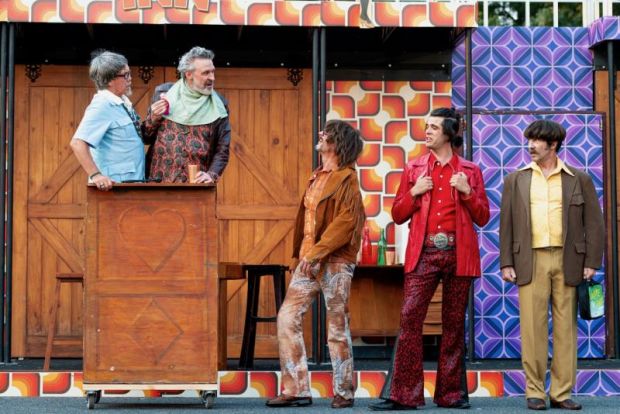The Merry Wives of Windsor
The Merry Wives of Windsor features the affable but mischievous Sir John Falstaff (Peter Houghton); a character who appears in three Shakespeare plays. This production sets the action in the early seventies where the social and sexual revolution saw more relaxed attitudes towards love, marriage, sex and romance. This is very fitting for the themes and events that take place in the very convoluted plot about seduction, affairs of the heart and questions of fidelity. The set and especially the costumes create a very cohesive look and evoke the flamboyance of the period well. The attention to detail to all aspects of seventies culture is impressive.

The progressive era setting also allows for the two women lead characters to take centre stage. Mistress Ford/Alice (Elizabeth Brennan) and Mistress Page/ Margaret (Anna Burgess) combine forces to ridicule Falstaff’s preposterous and presumptuous attempts to make sexual advances towards the two very liberated married women. This raises concerns for their husbands who mistakenly suspect their wives of infidelity. The story contains a subplot related to the romantic life of Anne Page’s (Maddie Somers). Anne’s parents are keen to see her make a good marriage but they each have very divergent ideas about the definition of a suitable match.

The plot twists are numerous, and the story is quite convoluted relying heavily on delivering details in its dense prose. The casting of the show and the exuberant performance style go a long way in making the complexities of the story clear. Although, stage presence and enjoyment are prioritised over the clarity of the plot, and this requires the audience to surrender themselves to the mayhem that ensues. However, this is not presented as an onerous task, and the production encourages the audience to take pleasure in the vibrancy of the delivery. Somers and Burgess convey a strong and sensible rapport between the women making the men who surround them often appear foolish in contrast. This is especially effective in portraying Falstaff in very facetious and uncomplimentary light.

The production is also supported by a great soundtrack which makes a significant contribution in recreating the era. As is often the case with the Australian Shakespeare Company, the lyrics of the songs help to advance the plot or convey the emotional state of the characters. This is a highly entertaining production that places great emphasis on enjoying the language and buoyancy of Shakespeare’s imagination.
Patricia Di Risio
Photographer: Ben Fon
Subscribe to our E-Newsletter, buy our latest print edition or find a Performing Arts book at Book Nook.

